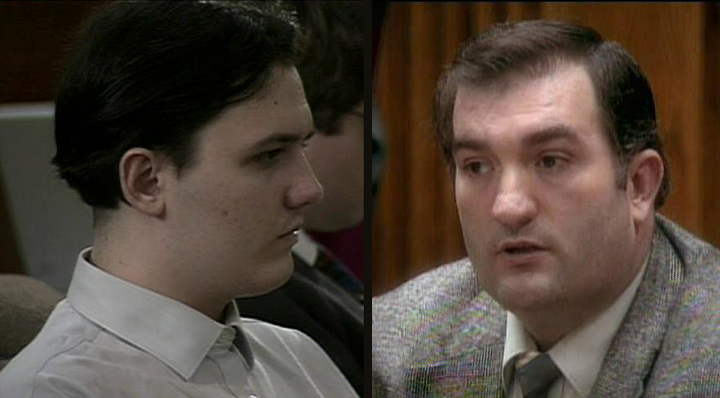
Damien
Echols / Detective Bryn Ridge
Echols
Versus Ridge, Round One
On May 7th, 1993, the day
after the bodies were found, parole officer Steve Jones and Crittenden
County Drug Task Force Agent Lt. James Sudbury visited Damien Echols
at his trailer to question him about the murders. He would be
visited twice more on May 9th by Detectives Shane Griffin and
Bill Durham. Then on May 10th, Damien Echols was brought into police
headquarters for eight hours of interviews. These interviews with
Lt. Sudbury and Detectives Bryn Ridge and Bill Durham would become the
foundation for the case against him.
Over the course of the investigation, Detective
Ridge became a true believer in the occult nature of the murders.
He was asked on the witness stand why he believed the murders
were cult related. Out of the presence of the jury, he rapidly ticked off
a long list of reasons.
Ridge: One of those factors is that it was an overkill. Way
more injuries than necessary to kill the children. There was
torture involved. The removal of the penis. The penis is a
symbol of power according to Damien's own statement. Placement in
the water, water is, has Satanic symbolism according to Damien's own
statement. The eight year old [portion missing] Are that
items are to be returned three-fold. Three is a Satanic
importance in symbolism. Crossroads area meaning neither in the
middle of community but nor in the extremes of nature, it's sort of a
um neither in the city nor out of the city, neither public nor
completely private. Cult meetings, most cult meetings or rituals
are held in deserted isolated areas, wooded areas away from
people. Uh, in blood rituals many times parts of the victims are
removed, possibly eaten, or kept for use in other ways. The
notation being that the penis was not found. The bodies were in
the nude, the Satanic term for that would be "skyclad." Stab
wounds, patterns, may have been done for the purpose of
bloodletting. Incision to the sex organs or mutilations, cuts or
bruises. Being a clean site, Satanic or occult symbolism would be
mean that a clean site would have been noted. Injury patterns,
most sites would be on private property, not on public property, not
normally travelled. Mutilation, sex organs would be mutilated or
removed. The victims will be males, penis or testicles will be
removed. The eyes will be gouged. [Detective Ridge, in limine testimony, Echols/Baldwin trial]
What was said
during Echols hours of interrogation became a point of contention. None of the interview was recorded.
Ridge explained that Echols was not considered a suspect when he came
in - but that he came to consider Echols a suspect because of his
answers. As the prosecution put it:
You've
got thousands of pages of paper, you've got hundreds of people who were
questioned and what they came up with was, when Damien was talked to,
there was no recording. Well until--as Detective Ridge testified, until
he answered the questions the way he did, he was not a suspect. But
because of the way he answered those questions--saying two drowned and
one cut up more than the others, he certainly became a suspect.
[Fogleman closing argument, Echols/Baldwin trial]
When
requesting an interview with Jason Baldwin, Ridge used recording as a
means to defend against accusations of exaggerating or changing
statements.
Angela Grinnell
[Jason Baldwin's mother]: Cause I told him to, um, um cause I'm scared
cause y'all put words in his mouth and make things, make a mountain out
of a molehill. And uh. . .
Ridge: Well, that's the reason we got tape recorders.
[snip]
Ridge: You understand that that we tape our conversations.
Angela Grinnell: a fool's worst, worst. . .
Ridge: We don't put words into people's mouths. [Angela and Terry Grinnell interview with Detective Ridge, June 4, 1993] (The interview with Baldwin never took place.)
During his testimony Ridge acknowledged there were
at least four sets of notes regarding his interviews with Echols; he
made handwritten notes in response to questions; he made a handwritten
draft of a summary report; he made a typed summary report; and Lt.
Sudbury, also present, took his own notes. Ridge referenced his
typewritten summary during his testimony.
Four aspects of the Echols May 10, 1993 statements were presented during the trials
as evidence: inside knowledge; cryptic statements suggestive
of guilt; demonic references; and, the answers, demeanor, and affect of
a killer.
Inside
knowledge - the drowning
In reaching the conclusion of Echols' guilt, the jury cited,
"Incriminating testimony - Ridge Too close to
facts." [Jury notes, Cons, Echols] The prosecution,
in their closing statements, alleged that Echols knowledge of the
murders was beyond coincidence.
And then
he tells Detective Ridge, when Detective Ridge asked him, "How do you
think they died?" -- "Mutilation. Two of them probably drowned.
One of them was cut up more than the others."
Coincidence? He just guessed? Did the police even
know that two drowned at that point? [Fogleman closing
argument, Echols/Baldwin trial]
According to the autopsy reports, the cause of death of two of the
victims was multiple injuries with drowning. Fogleman
conflated the testimony to fit this. Nowhere had it been
claimed that Damien had said two of the victims had probably
drowned. From Detective Ridge's typed summary:
When asked
about what he had heard about how the murders had occurred he stated
that they probably died of mutilation. He stated that he heard that
some guy had cut them up. He heard that they were placed in the water
and that they may have drowned. He stated that because of
what he had heard he believed that at least one of the boys had been
cut up. He stated that one of the boys may have been cut more than the
others. [Echols interview summary, Detective Ridge, May 10,
1993]
Detective Ridge
referenced this during his testimony.
Fogleman:
Did he tell you anything about how he believed that the children died?
Ridge:
He said that they probably died of mutilation, some guy had cut up, cut
the bodies up. Heard that they were in the water,
they may have drowned. He said at least one was more cut up
than the others. [Ridge testimony, Echols/Baldwin trial]
"Heard that they were placed in the water and that they may have
drowned" changed in successive iterations by the prosecution from "heard
they drowned" to "two of them probably drowned" to "saying two
drowned." [Quotations from Ridge's summary, Davis'
cross-examination of Echols, and Fogleman's closing arguments,
respectively]
Echols
denied saying he had heard they were drowned.
Davis:
You indicated that you heard they were drowned?
Echols:
No. I indicated I heard they were mutilated.
Davis:
So when he put down in his response to that question, "Heard that they
drowned," he made that up, too? That just isn't true?
Echols:
They made up a lot of stuff so far --
Davis:
Answer my question.
Echols: No, it is not true.
Davis:
You never said that. The officer just put that in on his own?
Echols:
Yes, he did.
[Echols testimony, Echols/Baldwin trial]
In fact,
this was something Davis had invented by removing the clause between
what Echols was was claimed to have said he heard "they were placed in water" and the
qualified statement "they may have drowned."
Davis:
And you knew about the drowning, correct?
Echols: I
knew they were in the water. I didn't know that they drowned. [ibid]
Echols testified he had gathered some of the details of the case from
the media.
Price: Do you
recall the Commercial Appeal newspaper article on May the 7th,
1993. Read the headline right there, please.
Echols:
"Mutilated Bodies of Three Boys Found in Bayou." [ibid]
Fogleman countered that Echols account was too specific to have come
from the newspapers, again fixating on Echols' knowledge that two had drowned.
Remember reading
from the newspaper article trying to suggest, well he got these details
out of the newspaper. What did they read to you? Said all of them were
sexually mutilated or castrated. Said they were found in water. Wasn't
anything about two of them drowning. [Fogleman closing arguments,
Echols/Baldwin trial] (Note. Although
newspaper articles existed that did say all of the victims were sexually mutilated,
the defense did not present these stories. There is no record
in Ridge's notes or testimony that Echols referred to sexual mutilation
or castration.)
Inside knowledge - one injured more than the others.
Ridge
made a note that Echols had said, "He stated that one of the boys may
have been cut more than the others." [Echols interview summary, Detective Ridge, May 10,
1993] This probably referred
to Chris Byers being sexually mutilated.
Davis confronted Echols about this statement.
Davis:
Said, "They were probably cut up, one more than the others?" Those are
your words, aren't they?
Echols: He asked me was one
cut up more than the other. I said yes, they were, probably.
[Echols testimony, Echols/Baldwin trial]
[again, later]
Davis: You knew that
one was cut up more than the others?
Echols:
Whenever they were asking me about mutilation, I thought different from
mutilation. What I call mutilation was different from what I seen up
here.
Davis: I was asking about one being cut up
more than the others.
Echols: He asked me was it
possible. He said, "Do you think one was hurt worse than the others?" I
said, "Yeah, I guess."
Davis: Oh, so again that
particular area was one of those things where Officer Ridge told you
and that wasn't your response? You just responded about the drowning
and mutilation?
Echols: If he didn't get the answer
he liked, he would go back and try to get me to say something else.
Davis:
And it is your testimony specifically that you weren't the one who said
one was cut up more than the other?
Echols: No, I
did not.
Davis: That was Officer Ridge that said
that?
Echols: I agreed with him when he said that.
[ibid]
After the
defense had presented newspaper articles with some of the facts, Davis
returned to the subject of one child being more injured than the
others.
Davis: Those articles
[previously presented] didn't say a single thing about one person being cut up worse than the
other, did they?
Echols: No, they did not.
Davis:
Didn't get that out of the newspaper?
Echols:
Uh-uh. [ibid, final exchange of Echols' testimony]
Fogleman included this as guilty knowledge in his closing
argument.
Remember reading from the
newspaper article trying to suggest, well he got these details out of
the newspaper? [snip] Wasn't anything about one of
them cut up more than the others. And that came from this
defendant's over here own mouth. [Fogleman closing argument,
Echols/Baldwin trial]
Although not presented at trial, Echols may have been referring to this
news article. From the May 7, 1993 issue of the West Memphis
Evening Times: "Byers, father of Christopher Byers, said
Gitchell told him one youth had been hit above the eye, a second's jaw
was injured, and the third 'was worse than that.'"

Jury notes, cons, Damien Wayne Echols
"Incriminating testimony - Ridge / Too close to facts"
Cryptic
Statements Suggestive of Guilt
Ridge noted a seemingly sinister response by Echols regarding his view
of evil.
Damien
went further to explain that in his Wicca religion he knew that evil
done comes back three times. He stated that meant that any evil done by
a person would be rewarded by the person doing the deed having three
times the evil done to him in revenge. [Damien Echols interview summary, Detective Ridge, May 10,
1993]
The term "rewarded" was seemingly out of place with "revenge." Ridge testified about this statement.
Fogleman:
What did he say about uh doing evil, about how that would
return?
Ridge: Doing evil would be returned three
times, in other words, that the evil done would be returned in revenge
three times back to the doer. [Ridge testimony, Echols/Baldwin trial]
Echols' attorney brought up that Lieutenant Sudbury, also present during the
interview, had written more benign notes.
Price:
(Reading from questionnaire:) Have you ever wondered what it would be
like to kill someone even if you didn't go through with it? I
believe the answer is on 19: Only out of anger to beat someone
up. Whatever you do comes back to you three times, so does
good.
Ridge: I don't remember that
portion. [ibid]
Echols defended his comment during testimony.
Davis:
Did you tell him you never thought about killing people?
Echols:
I don't remember. [snip]
Davis: You
responded to him that whatever you do can come back to you three times
over?
Echols: Three times as bad or as good. [ibid]
Not only were Echols words seen as evidence of guilt - so was his silence.
The subject ceased to denie his
involvement. (Admission through absence of denial) [Detective Bill
Durham notes, Echols post-polygraph interview, May 10, 1993]
This was proceeded by
[Echols said] "I will tell you
all about it if you will let me talk to my mother." Detective Ridge
brought his mother in to my office to talk to him. After talking to his
mother he again denied being involved in the murders. After
approximately twenty minutes, I asked: "Your'e never going to tell
anyone about this but your doctor, are you?" he replied:
"No". [ibid]
Echols described the exchange during his testimony.
Price:
There was -- do you recall Detective Ridge testifying that you made
some comment to him about, "I will tell you everything I know if you
let me talk to my mother."
Echols: Yes.
Price:
Did you tell him that?
Echols: Yes.
Price:
Did you talk to your mother?
Echols: Yes, I did.
Price:
Why did you give that response to him?
Echols:
Because that's the only way he would let me talk to my mother. They
kept asking me, saying, "Even if you did not do it, we know that you
know something about it." So I said, "I will tell you everything I know
after you let me talk to my mom." After I talked to my mom, he said,
"All right, now tell us everything you know." I said, "I don't know
nothing," and they got mad.
[Damien Echols testimony, Echols/Baldwin trial]
In cross-examination, an issue was made as to whether Echols had said, "I
will tell you all about it" or "I will tell you
everything I know." Echols flat-out declared the police had lied.
Davis: And you did
make the statement to the officer that, "I will tell you all about it
if you let me talk to my mother"?
Echols: I said, "I
will tell you everything I know."
Davis: If he says
in his report that you said, "I will tell you all about it if you let
me talk to my mother," that's inaccurate, too?
Echols:
That's another of his lies. [ibid]
Fogleman referenced this in his closing argument.
Then
you've got Damien's statements. He talks to the police and
does he make an outright confession to the police?
No. But what does he tell Detective Durham after he's been
questioned for a while. "Look, let me talk to my mother and I'll tell
you all about it, I'll tell you all about it." [Fogleman closing argument,
Echols/Baldwin trial]
Echols had drawn the battlelines - and in all probability had lost the
war. Either the police were liars or he was.
Continued in Echols Versus Ridge, Round Two
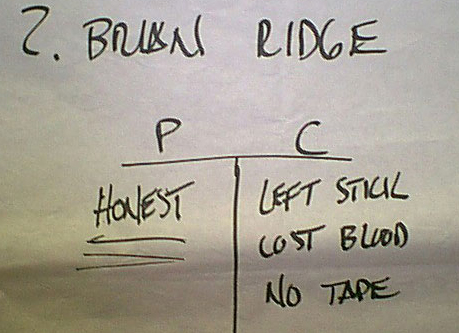
Detective Ridge, Jury notes, Pros and Cons.
Pro: Honest.
Cons: Left stick refers to sticks left behind at crime scene.
Lost blood refers to the blood samples of the Bojangles man.
"No tape" refers to not tape-recording Damien Echols.
|


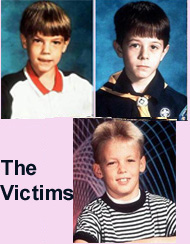
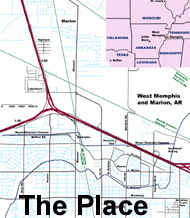
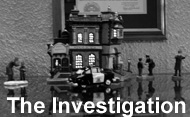
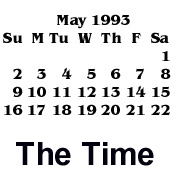
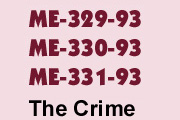
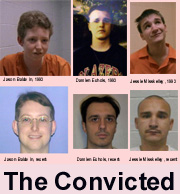
![]()